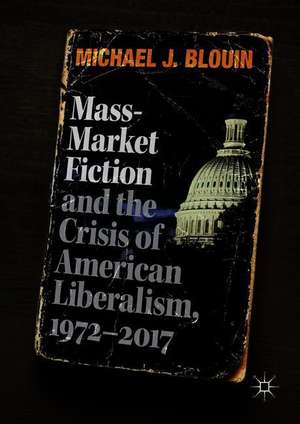Mass-Market Fiction and the Crisis of American Liberalism, 1972–2017
Autor Michael J. Blouinen Limba Engleză Hardback – 28 mai 2018
Toate formatele și edițiile
| Toate formatele și edițiile | Preț | Express |
|---|---|---|
| Paperback (1) | 523.91 lei 6-8 săpt. | |
| Springer International Publishing – 10 ian 2019 | 523.91 lei 6-8 săpt. | |
| Hardback (1) | 698.62 lei 6-8 săpt. | |
| Springer International Publishing – 28 mai 2018 | 698.62 lei 6-8 săpt. |
Preț: 698.62 lei
Preț vechi: 821.91 lei
-15% Nou
Puncte Express: 1048
Preț estimativ în valută:
133.69€ • 140.57$ • 110.46£
133.69€ • 140.57$ • 110.46£
Carte tipărită la comandă
Livrare economică 16-30 aprilie
Preluare comenzi: 021 569.72.76
Specificații
ISBN-13: 9783319893860
ISBN-10: 3319893866
Pagini: 297
Ilustrații: IX, 253 p.
Dimensiuni: 148 x 210 mm
Greutate: 0.47 kg
Ediția:1st ed. 2018
Editura: Springer International Publishing
Colecția Palgrave Macmillan
Locul publicării:Cham, Switzerland
ISBN-10: 3319893866
Pagini: 297
Ilustrații: IX, 253 p.
Dimensiuni: 148 x 210 mm
Greutate: 0.47 kg
Ediția:1st ed. 2018
Editura: Springer International Publishing
Colecția Palgrave Macmillan
Locul publicării:Cham, Switzerland
Cuprins
1. Introduction: Popular Paperbacks and the Transformation of American Liberalism.- 2. The Reading, Writing, and Arithmetic of Mass-Market Fiction.- 3. Danielle Steel and New Home Economics.- 4. Michael Crichton and the Heritage of Invention.- 5. Tom Clancy and the Liberal Family Tree.- 6. John Grisham and the New Economy Thriller.- 7. Dean Koontz and the Problem with Power.
Notă biografică
Michael J. Blouin is Associate Professor of English and the Humanities at Milligan College, USA. His research interests include critical theory and popular culture. He is author of Magical Thinking, Fantastic Film, and the Illusions of Neoliberalism (Palgrave 2016) as well as a recent guest editor for a special issue of The Journal of Popular Culture entitled “Neoliberalism and Popular Culture” (April 2018).
Caracteristici
Addresses one of the most pressing issues facing readers in the United States: what has happened to “liberalism” over the past fifty years, and given current conflicts, where might it go from here? Focuses on contemporary popular fiction that has often been overlooked in academic studies, through a cultural studies lens Teases out unexpected complexities found within the analyzed texts
